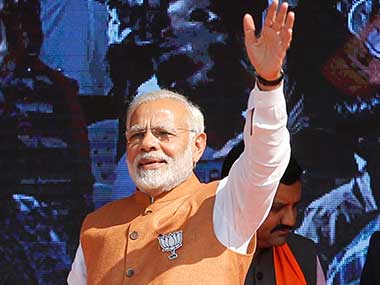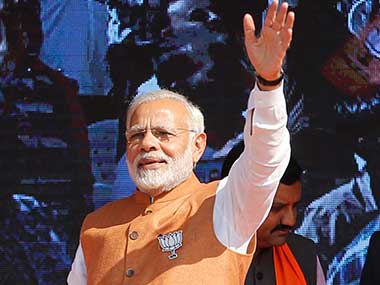Two separate comments on the banking sector — one from Prime Minister Narendra Modi and the other from Union finance minister Arun Jaitley on Tuesday — offer interesting insights into this government’s thought process on how it wants to take the sector reforms ahead. Of these, the most critical comment came from Modi when he said Indira Gandhi’s bank nationalisation programme in 1969 (read here ) was a drama played by the then Congress government to “cover up” the sacking of Morarji Desai. The claim that nationalisation was done to serve the poor wasn’t fulfilled ultimately, Modi was quoted as saying. Jaitley, in a written statement , discarded a “rumour” that the Modi government waived bank loans to “capitalists,” and blamed the previous Congress-led UPA government for the build-up of the non-performing assets (NPAs) that are plaguing the sector today. Jaitley’s comments were apparently triggered by the allegations of the Congress leaders, including former union finance minister P Chidambaram and party vice-president Rahul Gandhi that this government’s banking sector policies often favour the rich and are hurting small borrowers. How did the NPA build-up happen? On the issue of build-up of bank NPAs and the Modi government’s policies, Congress leadership is on a weak ground. Much of the bad loan addition in state-run banks happened during UPA-I and II when the government banks completely forgot about prudent lending to worthy borrowers and found themselves vulnerable to the infamous corporate-political nexus. [caption id=“attachment_4233375” align=“alignleft” width=“380”]  File image of Prime Minister Narendra Modi. AP.[/caption] Loans were freely given away to the likes of Vijay Mallya’s Kingfisher Airline while bankers themselves were unsure about the financial health of the borrower and the ability to repay the loan. Such lending continued for a long period until the boom period lasted. Along with the accumulation of this troubled chunk, when the economic cycle turned, banks faced the heat. This prompted state-run banks to evergreen the loans (technically retaining bad loans as standard loans on the book) on a large scale. Each and every outgoing bank chairman passed the burden to his/her successor, which is the reason why banks showed a big hit on their net earnings after making hefty provisions. The then UPA government largely continued as a mute spectator. Hence the Congress leaders, who were part of the government, are answerable to the banking sector crisis today. Modi govt’s role To be sure, the Modi government too woke up late to address the problem. In the initial years, it didn’t pay much attention to the capital needs of the state-run banks or kick off radical reforms to address the systemic problems in the sector. The RBI began action on the NPA problem in 2015 when it spelled out stricter rules to banks on early recognition of assets and punitive provisioning rules for the lenders who do not go for swift resolution of problematic assets. But, two questions remained unanswered — even if the clean-up process happens,: a) How will the legal resolutions of disputed large assets (corporate borrowers) happen within an inefficient system? b) Who will provide the capital to state-run banks to fill up the holes in their balance sheets? Most of the large NPA cases involving wilful defaulters (people with the ability to repay but wouldn’t repay) were either stuck at overburdened debt recovery tribunals (DRTs) or various other courts. By the time legal resolution happened, the underlying assets lost value, like in the case of Kingfisher, leaving nothing much for the banks to recover. But, when, in May 2016, Parliament passed the bankruptcy code, this was seen as the first solid step in the direction of the stressed assets resolution. Subsequently, the RBI sent two lists of companies to banks to initiate bankruptcy proceedings. These steps largely take care of the resolution of large NPAs. Later, the government amended the insolvency act to prohibit tamed promoters (wilful defaulters/ habitual loan defaulters) from bidding again on their assets. The government finally acted on the second problem—lack of capital— when it recently announced Rs 2.11 lakh crore capital infusion into state-run lenders. Although much of it is through recapitalisation bonds, the details of which are yet to be worked out, this offers a big relief to the banking sector. To cut a long story short, the Modi government has been largely in the right direction as far as banking reforms are concerned, compared with the UPA regime. But, the one large area missing so far is a firm intent to privatise the public sector banks — exactly the issue Modi touched upon in his speech on Tuesday. Modi called Indira Gandhi’s bank nationalisation a drama that didn’t benefit the poor. This claim is not entirely correct. Bank nationalisation has indeed helped improve access to formal banking to the poor in far flung areas. The private sector banks have largely limited their operations to urban centres. But, Modi is right in saying that the progress has not been as swift as it should have been in the years that followed bank nationalisation. But, if these banks have failed to deliver, the reasons can be traced to excessive government control, resultant lack of autonomy and absence of professional managements. The short point is that If Modi is convinced that Indira Gandhi’s bank nationalisation policy was drama, this is the time for him to undo the drama and let these banks compete in a free market.
Narendra Modi’s claim on bank nationalisation is not entirely correct. It has indeed helped improve access to formal banking to the poor in far flung areas
Advertisement
End of Article


)




